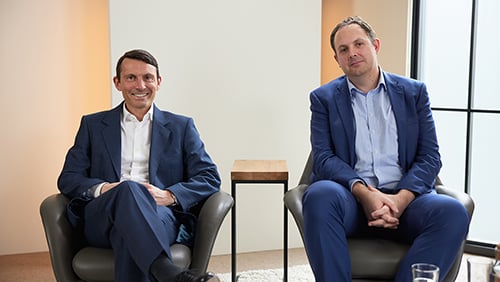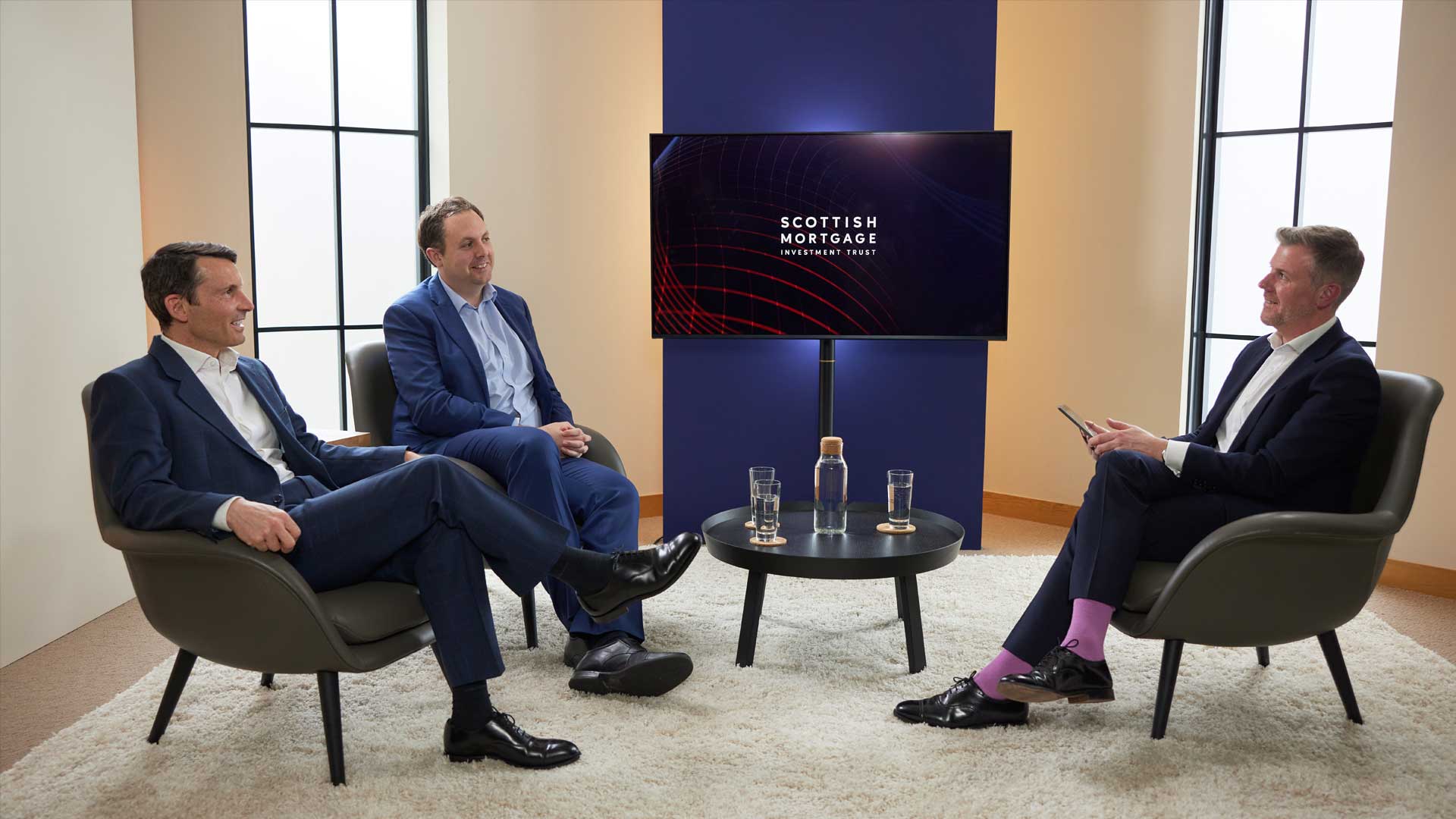Paymasters of the universe
Jemima Kiss
Companies that can take the pain out of online payments are reaping big benefits, Scottish Mortgage Investment Trust joint manager Tom Slater tells Jemima Kiss.

Please remember that the value of a stock market investment and any income from it can fall as well as rise and investors may not get back the amount invested.
When Tom Slater went to a meeting with Amazon 15 years ago, he wanted to know how the company was planning to improve the retail experience for its customers. Was it investing in technology that would improve the quality of recommendations, simplifying the page design or delivering better targeted ads? Actually, Slater explains, the conversation kept coming back to taking milliseconds off page-loading times to allow the user to move efficiently through the buying process. “With payments technologies, what really matters is doing everything you can to drive velocity and volume of revenues for your customers. And there are huge gains to be made from that,” he says.
These kinds of incremental, friction-reducing improvements are key to the efficiency of payment transactions. Global payment revenues will reach $1.9tn by the end of 2020, McKinsey, the consultancy, predicts – and that’s after an estimated 10 per cent drop caused by the coronavirus pandemic. Traditional banking and payment processing services have reaped the lion’s share of the profits from fees and service charges in this sector. But they are now being outpaced by Amazon, Apple and Google’s innovation in mobile and online payments. And there is also a new breed of ambitious, efficient and dynamic new technology companies claiming their own share of this market by offering faster, cheaper and more consumer-friendly services. In a market worth nearly $2tn, you don’t need much market share to create a very significant business.
Stripe, Affirm and TransferWise are all private companies in the Scottish Mortgage portfolio, and all founded by entrepreneurs who identified a common pain point for consumers.
Well respected for its engineering-focused approach, Stripe offers an elegant and powerful solution for the knotty technical problems of payment processing. Founded in San Francisco in 2010, Stripe was valued in April at $36bn, bolstered by the pandemic pushing many businesses online. “What Stripe has done,” Slater explains, “is come at it from a software engineer’s point of view – all a startup needs to do is insert seven lines of code to its site to handle payments. This takes away those really complicated issues around payment processing.” Before Stripe launched its solution, adding payment processing capability would take weeks of development work.
Until tech entrepreneurs came to online payments, the incumbents had been able to get away with slow, outdated services that made them a lot of money. “But the opportunity now is for startups to create something with a massive addressable market,” Slater says. “Trillions of dollars are flowing through these networks. This is particularly pertinent for Stripe – if every online business is using Stripe to process payments, it effectively becomes a royalty on the growth of the internet.” Customers might not notice a discreet ‘powered by Stripe’ label on the site they are buying on. Stripe sits between a retailer and the banks, a third-party processor and payment gateway that processes debit and credit card transactions. And that puts it in a strong position to launch ancillary services, such as fraud prevention or its own debit card.
London-based TransferWise has achieved both scale and liquidity in two large markets, the US and UK, which makes it extremely competitive. Its currency transfer service could also become a powerful platform for add-on services. “There’s value in having that mindshare with customers, which means they could look at delivering services for small-to-medium businesses off the back of that,” says Slater. TransferWise has already introduced multi-currency accounts that allow users to transfer money instantly between countries at very low conversion fees of between 0.4 per cent and 0.7 per cent. Launched in October 2019, the multi-currency accounts were holding £2bn in deposits by June 2020. It’s a service that bypasses the relatively high conversion fees of banks and builds on TransferWise’s reputation for transparency and fair rates among its very loyal userbase.

Building trust with consumers has worked well for Affirm, the eight-year-old point-of-sale credit company. Its style of transparency and fair rates contrasts sharply with the small print and high annual percentage rates of conventional point-of-sale credit offerings, and has resonated with millennials and Gen Z, who account for more than half its 5.3m customers.
Affirm allows its retail clients, including Peloton and Walmart, to offer a buy now pay later option at the online checkout. “In the financial world, the challenges are acquiring customers and the cost of acquiring customers relative to that value to you,” says Slater. “So you need to bring on as many good customers as you can and then have a longer relationship with them.” Online, there are far more data points that sites can use to assess the user’s creditworthiness, including how long it takes to complete an application, what time of day they apply and even whether they paste in information – a favourite habit of fraudsters. “The better you get at evaluating attractive customers, the more you can get that flywheel going of providing a good experience to users so that retailers want to use your service.”
All three of these payments companies share some key characteristics: online-enabled businesses that are rapidly growing their share of the market, and with modest capital requirements. It’s also significant that all three are led by their founders, according to Slater. In the case of Affirm, that founder is Max Levchin – the Ukrainian-American software engineer who co-founded PayPal. “That combination of reputation and the respect he has earned, combined with the scale of the opportunity, makes it really interesting,” he says.
Experienced, well-resourced founders are also an advantage in weathering the coronavirus pandemic. “Our philosophy is that we can’t predict the future and what the impact will be on the economy,” Slater says. “But we just look for robust, adaptable businesses, led by visionary people and with strong cultures, that can navigate whatever is thrown at them.”
Scottish Mortgage also invests in the payment and lifestyle platform Ant Group, which we wrote about in the spring 2019 edition of Trust.

Stripe’s band of brothers
Patrick and John Collison were born in Limerick, Ireland, to parents who worked in electrical engineering and microbiology. Aged 16, Patrick won the prestigious BT Young Scientist of the Year award for his work developing a programming language and artificial intelligence system, aced his exams, and then left for MIT in 2006. Younger brother John was awarded the highest ever score received by a student for the Irish Leaving Certificate and won a place at Harvard shortly afterwards.
In 2009 they began work on the idea for what would become Stripe: the brothers planned to debug the messy, inefficient and expensive systems that connected banks and retailers with payment processors, and launched in 2011. Patrick is chief executive, focusing on engineering and representing the company externally. Highly charismatic and a voracious reader, he was also behind a $1m donation from Stripe to a campaign group pushing for more affordable accommodation to address California's housing crisis. John is president, leading partnerships and sales, and has a reputation for being incredibly approachable and thoughtful. After the Black Lives Matter protests in June 2020, both brothers stated they were researching social justice groups whose work they could support.
Legendary Silicon Valley investor Mike Moritz, a partner at Sequoia Capital and Stripe board member, describes them as humble and well-rounded. "There's such an improbability to their story – that these brothers from a little village would come to build what could well be one of the most important companies on the internet." At 31 and 29, they are now two of the youngest billionaires in the world, worth an estimated $3bn each.
About the author - Jemima Kiss
Jemina Kiss has been covering tech since 2002, and spent 10 years at The Guardian. Based in San Francisco, she recently launched Hothouse Solutions, a weekly climate action newsletter.
Illustration by darlingforsyth.
Important information and risks
nvestments with exposure to overseas securities can be affected by changing stock market conditions and currency exchange rates. The trust has a significant exposure to unlisted investments (private companies). The trust’s risk could be increased as these assets may be more difficult to buy or sell, so changes in their prices may be greater.
The views expressed in this article should not be considered as advice or a recommendation to buy, sell or hold a particular investment. The article contains information and opinion on investments that does not constitute independent investment research, and is therefore not subject to the protections afforded to independent research.
Some of the views expressed are not necessarily those of Baillie Gifford. Investment markets and conditions can change rapidly, therefore the views expressed should not be taken as statements of fact nor should reliance be placed on them when making investment decisions.
Baillie Gifford & Co Limited is wholly owned by Baillie Gifford & Co. Both companies are authorised and regulated by the Financial Conduct Authority and are based at: Calton Square, 1 Greenside Row, Edinburgh EH1 3AN.
The investment trusts managed by Baillie Gifford & Co Limited are listed on the London Stock Exchange and are not authorised or regulated by the Financial Conduct Authority.
A Key Information Document is available by visiting www.bailliegifford.com
49203 IND WE 1795







